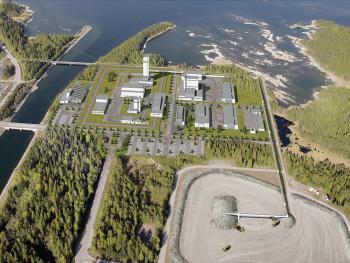CORRECTED - An earlier version of this story incorrectly stated the recommended fee as 0.3 öre per kWh and the current fee as 0.1 öre per kWh. The correct values are 3 and 1 öre per kWh respectively.
The Swedish Radiation Safety Authority (SSM) has recommended a tripling of the fee paid by the country's nuclear power industry towards paying for management of the country's nuclear waste.
 |
| How Sweden's final repository for used fuel could look (Image: SKB) |
SSM has been tasked with assessing what level of fee Sweden's nuclear generators should be required to pay into the country's Nuclear Waste Fund for the next three years. Basing its assessment on information gathered from the relevant organisations - including cost estimates from the Swedish Nuclear Fuel and Waste Management Co (SKB) - SSM has recommended to the government that the fee should be set at 3 öre per kWh of nuclear electricity produced. The current level is 1 öre per kWh. (1 öre is worth approximately $0.001.)
According to SSM, much of the increase is down to new estimates from SKB indicating that the remaining costs of the country's planned final repository for used nuclear fuel have grown by about SEK 18 billion ($2.7 billion) from previous estimates made in 2008. SSM also says it believes that SKB has underestimated future costs, and it has adjusted the proposed fee increase to reflect this.
SSM economist Peter Stoltz described the rise as a "large increase", but said it was necessary to ensure that the state should not be forced to bear the costs of nuclear waste management and decommissioning, which are the responsibility of the nuclear industry. SSM has submitted its proposals to the Swedish government, which will make the final decision on the level of the fee.
Sweden's nuclear waste management program is one of the most advanced in the world. The country already operates a final repository for operational nuclear wastes, and earlier this year SKB submitted an application for a licence to construct a final repository for used nuclear fuel at Forsmark. Site preparation work is pencilled in to start in 2013, with full construction expected to start on the repository in 2015. The facility would then begin operations in the early 2020s.
Researched and written
by World Nuclear News




_28178.jpg)
_66891.jpg)
_30199.jpg)
_72306.jpg)





